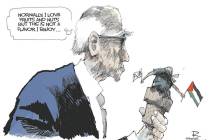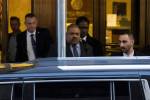Finding justice
Last Sunday you wrote of the crisis in the shortage of Nevada public defenders. The Review-Journal argues that the system actually works while the professional government class proposes throwing millions at the problem.
But no suggestion from either quarter proposes identifying the problem and fixing it systemically.
The crux of the problem stems from caseload. Caseload is a product of not only the number of cases, but the complexity of the cases presented. Both the number of cases and their complexity are mushrooming. Not surprisingly, this explosion arises from the actions of the same class crying for increased funding.
Generally moral and God-fearing, Americans face volumes of new laws unrelated to The Golden Rule. Professional legislators addressing the crisis de jour willy-nilly add volumes of new and unique "crimes" which the public, the prosecutors and the defense attorneys must address. Caseloads, as a consequence, soar.
Each expansion in crimes correlatively presents new definitions and elements raising the complexity of each case. Courts then add rule upon dictate upon protocol and the process explodes. Witness the O.J. Simpson trial where nine months were devoted to the question: Did he kill her?
A final major factor affecting caseload is prosecutorial and police overcharging (which is itself a result of over-legislating). Recently I was involved in such a case featuring a professional sports bettor. Because he consistently outguessed the casinos, he gambled under aliases to avoid scrutiny.
A casino discovered this and brought in the police. The police investigated for all of an hour and arrested the gambler without a warrant for eight alleged felonies.
These "felonies" included the violation of regulations that were long repealed and claimed federal crimes (that weren't) which no beat cop has any basis charging. When the prosecutor got the case, she discovered that many of the crimes claimed were not even crimes, let alone whether the gambler was guilty of anything.
Did the case then just go away? No. The prosecutor raised the stakes and charged 14 felonies instead. Curiously, for placing bets under an assumed name, one of the charges made was burglary.
The gambler spent days in jail and tens of thousands of dollars on defense. Nevada may, too, have spent tens of thousands of dollars chasing this putative evildoer. Finally, figuring out that it is not illegal to gamble under an assumed name, and there is nothing fraudulent about placing a bet at the odds the casino offered, the case was outright dismissed.
Charging 14 felonies where there was no crime burdens the system immeasurably. When one thinks of burglary, it takes a special kind of legerdemain to squeeze out such a charge for placing bets under an assumed name. Why would it be charged? Because it can be.
So how can the process be systemically fixed so that defense attorneys can defend?
First, stop criminalizing activities that are not inherently evil. Examples could include crimes such as doing business without a license, bookmaking, gun possession laws, crimes attacking personal use and possession of drugs, Internet gambling, etc.
Second, stop multiplying crimes already chargeable for the same activity. Examples could include redefining burglary to mean burglary, not passing hate-crime legislation, repealing elder crime law, etc. If the activities are crimes, then they are crimes.
Third, and perhaps most important, let's have some prosecutorial circumspection. Don't charge 14 crimes for a single action. For example, arson of a dwelling is already a 15-year felony. Yet on the same evidence the alleged perpetrator might face the following criminal complaint: 1) arson of a dwelling; 2) child endangerment; 3) assault; 4) battery; 5) attempted murder; 6) reckless endangerment; 7) criminal release of pollutants; 8) improper handling of dangerous chemicals; 9) vandalism; 10) trespassing; 11) malicious destruction of property; 12) burglary; etc., etc., etc.
If the bad guy put a match to a house, there's enough to put him away for a long, long time. Making the defense attorney defend a dozen crimes for a single act, again, geometrically multiplies the caseload without any corollary societal benefit. The state must also spend that much more on the prosecution.
Changes to the system can make the job of the defense attorney more manageable while society remains protected and the evildoers still go to prison. It can also save the state a proverbial ton of money on the prosecution side as the prosecutor's caseload becomes more manageable as well. Let's make some changes.
Bob Nersesian is a Las Vegas attorney.























